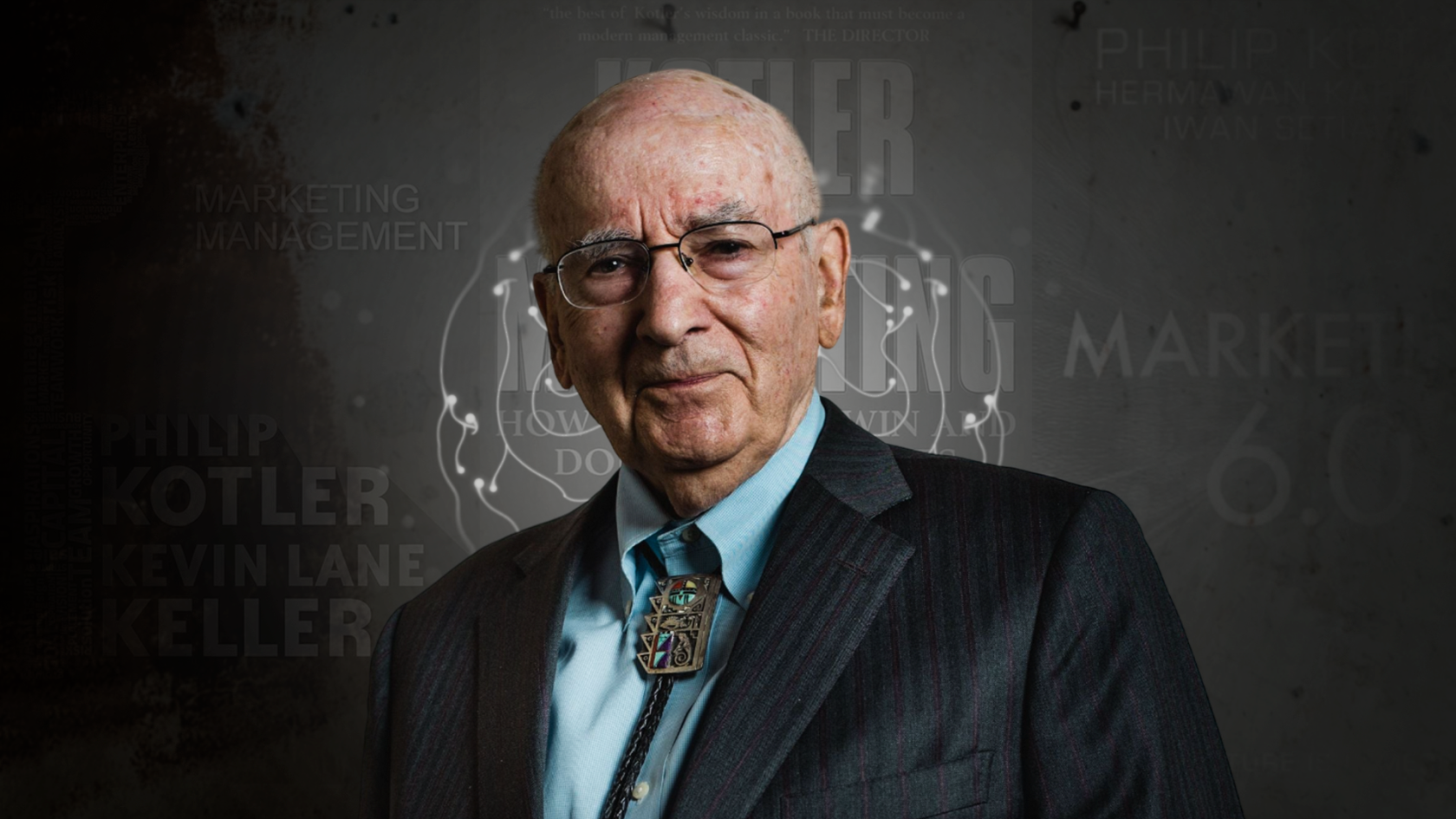
Who is the “Father of Modern Marketing”?

Philip Kotler (born May 27, 1931) is an American marketing author, consultant, and professor emeritus; the S. C. Johnson & Son Distinguished Professor of International Marketing at the Kellogg School of Management at Northwestern University (1962–2018). He is known for popularizing the definition of the marketing mix. He is the author of over 80 books, including Marketing Management, Principles of Marketing, Kotler on Marketing, Marketing Insights from A to Z, Marketing 4.0, Marketing Places, Marketing of Nations, Chaotics, Market Your Way to Growth, Winning Global Markets, Strategic Marketing for Health Care Organizations, Social Marketing, Social Media Marketing, My Adventures in Marketing, Up and Out of Poverty, and Winning at Innovation.
Kotler helped create the field of social marketing that focuses on helping individuals and groups modify their behaviors toward healthier and safer living styles. He also created the concept of “demarketing” to aid in the task of reducing the level of demand. He also developed the concepts of “prosumers,” “atmospherics,” and “societal marketing.” He is regarded as “The Father of Modern Marketing” by many scholars.
Early life
Kotler’s parents, Betty, and Maurice emigrated from Ukraine and Russia as teenagers and settled in Chicago. Kotler was the eldest of their three sons, born in Chicago on May 27, 1931. He studied at DePaul University for two years and was accepted without a bachelor’s degree into the master’s program at the University of Chicago (1953) and completed his Ph.D. at Massachusetts Institute of Technology (1956), earning both degrees in economics. He studied under three Nobel Laureates in Economic Science: Milton Friedman, Paul Samuelson, and Robert Solow. He did a year of postdoctoral work in mathematics at Harvard University (1960) and in behavioral science at the University of Chicago (1961).
Views about marketing
Kotler started teaching marketing in 1962 at the Kellogg School of Management, Northwestern University. He believed marketing was an essential part of economics and saw demand as influenced not only by price but also by advertising, sales promotions, sales forces, direct mail, and various middlemen (agents, retailers, wholesalers, etc.) operating as sales and distribution channels.
Philip Kotler holds that:
- “The organization’s marketing task is to determine the needs, wants, and interests of target markets and to achieve the desired results more effectively and efficiently than competitors, in a way that preserves or enhances the consumer’s or society’s well-being.”
- He links the profit motive to the satisfaction of consumer wants and society’s well-being. To market effectively, Kotler believes the marketing purpose of elevating consumer well-being must be put at the heart of company strategy and practiced by all managers.
- Kotler argued for “broadening the field of marketing” to cover not only commercial operations but also the operations of non-profit organizations and government agencies. He held that marketing can be applied not only to products, services, and experiences, but also to causes, ideas, persons, and places. Thus, a museum needs the marketing skills of Product, Price, Place, and Promotion (the 4Ps) if it is to be successful in attracting visitors, donors, staff members, and public support.
Writings and activities

In 1967, Kotler published Marketing Management: Analysis, Planning, and Control, it’s the world’s most widely adopted textbook in graduate schools of business. Whereas previous marketing textbooks were highly descriptive, this text was the first to draw on economic science, organizational theory, psychology of behavior and choice, and analytics. It described theory and practice and drew on findings from empirical studies and cases. On December 9, 1996, the Financial Times cited Marketing Management as one of the 50 greatest business books of all time.
Kotler is the author and co-author of over 166 published articles and 80 books. Kotler has also written books on such subjects as corporate social responsibility, education, environment, government marketing, healthcare, hospitality, innovation, museums, performing arts, place marketing, poverty alleviation, professional services, religious institutions, tourism, capitalism, and democracy.
Honorable distinctions
- In 1975, Kotler was the first person to receive the “Leader in Marketing Thought” award voted on by the academic members of the American Marketing Association.
- On February 16, 2013, he was the first recipient of the William L. Wilkie “Marketing for a Better World” award from the American Marketing Association to “honor marketers who have significantly contributed to the understanding and appreciation for marketing’s potential to improve the world.”[8] Also, in 2013 he was the first recipient of the Sheth Foundation Medal for Exceptional Contribution to Marketing Scholarship and Practice.
- On March 1, 2014, Kotler is number 16 on the list of the 30 World’s Top Management Professionals and the only marketer.
- On May 28, 2014, Kotler is inducted into the Marketing Hall of Fame in New York City.
- On April 23, 2016, Kotler received the Lifetime Achievement Award from Leaders International at the 6th Global Leadership Awards.
Ready to bring some creativity and innovation to your brand? Let’s make magic happen! Contact our creative agency today to elevate your brand and bring your vision to life.




